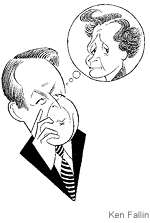 Al Gore dreams of Rachel Carson. Source of image: online version of the WSJ article cited below.
Al Gore dreams of Rachel Carson. Source of image: online version of the WSJ article cited below.
. . . The World Health Organization now estimates that there are between 300 and 500 million cases of malaria annually, causing approximately one million deaths. About 80% of those are young children, millions of whom could have been saved over the years with the regular application of DDT to their environments.
Carson cannot be blamed directly for these deaths. She didn’t urge total bans in "Silent Spring." Instead, on the single page obliquely acknowledging DDT as an anti-malarial agent, she writes, "Practical advice should be ‘Spray as little as you possibly can’ rather than ‘Spray to the limit of your capacity.’"
In the National Archives exhibit, Carson is described as "a passionate voice for protecting the environment and human health." Her concerns about the effects of insect death on bird populations were well-founded. But threats to human health were central to her argument, and Carson was wrong about those. Despite massive exposure in many populations over several decades, there is no decisive evidence that DDT causes cancer in people, and it is unforgivable that she overlooked the enormous boon of DDT for malaria control in her own time.
. . .
. . . DDT remains the cheapest and most powerful tool for stopping malaria. When sprayed on interior walls, it has virtually zero interaction with wild ecosystems. Yet when the topic of relaxing restrictions in order to save millions of lives comes up, someone inevitably brandishes a copy of "Silent Spring" and opposition is silenced so completely that you could hear a mosquito buzzing in the next room.
For the full commentary, see:
KATHERINE MANGU-WARD. "Suffering in Silence." The Wall Street Journal (Fri., April 20, 2007): W13.
(Note: ellipses added.)

